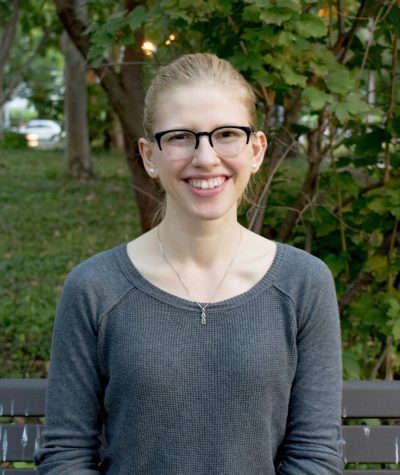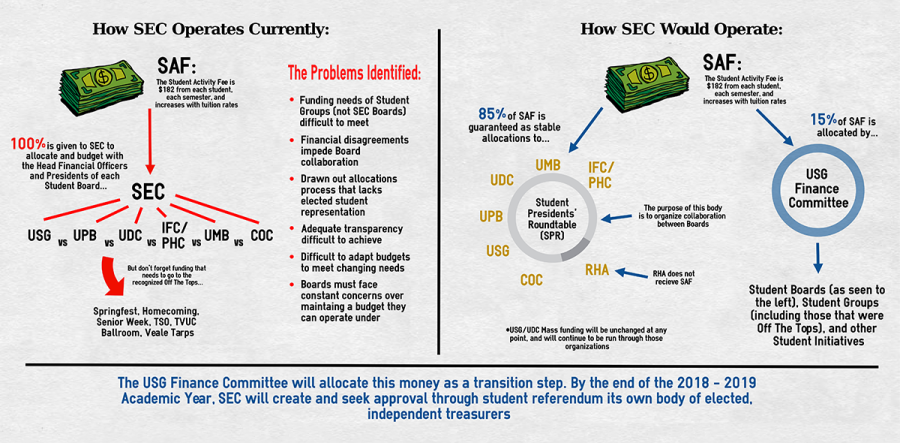SEC overhaul heading to referendum
At 1 a.m. on Friday, April 1, two large rooms in Thwing Center were filled with students for very different reasons. In the Jolly Scholar, students were celebrating the end of a long week. In an office in the basement, more than twenty students were putting the finishing touches on a long year of planning for organizational reforms.
The meeting began at 9 p.m. with each student in attendance receiving a copy of the new constitution drafted by the SEC Reform Task Force over the course of the past year. The Student Executive Council (SEC) went through their new constitution article by article, suggesting and then debating amendments. The final constitution, made out of four hours of work, was passed 13-0 through the boards. None of these changes are final, however, until the student body has approved them via a referendum.
“I think [the proposed reforms] present a solid solution to the longstanding problem of conflict and lack of collaboration at the SEC level,” said SEC Chair and ex-officio member of the SEC Reform Task Force Andrew Hodowanec. “I also believe just about everyone– boards, student groups, and the student body– gets something out of the reformed system.”
The SEC’s members, which include the president and finance chairs of the Undergraduate Student Government (USG), the University Program Board (UPB), the Undergraduate Diversity Collaborative (UDC), the University Media Board, the Class Officer Collective (COC), the Interfraternity Congress and Panhellenic Congress (IFC/PHC) and the Residence Hall Association (RHA), as well as representatives from off-the-tops Springfest, Senior Week, Homecoming and Thwing Study Over (TSO), vote every semester on how to allocate the approximately $177 Student Activity Fee (SAF) that each student pays each year.
One of the largest changes in the new constitution was the division of the total SAF income into two chunks. The first chunk, 85.77 percent of the SAF, will be given as stable, predetermined allocations to the boards. The remaining money, 14.23 percent of the SAF to be called the SEC Reserve Fund, will be divided up between these boards and the former off-the-tops, as well as other student initiatives. These portions work out to about $695,000 and $115,000, respectively.
If requests outside of the boards exceed 14 percent of the SAF, up to 4.24 percent can be taken out of the 86 percent and reallocated.
Who is dividing that 14 percent was another item of debate. For the time being, the USG Finance Committee will be tasked with its allocation. As per a provision in the constitution, by the end of the 2018-19 school year, the SEC will propose a referendum to the student body on creating its own committee of independent treasurers to allocate it.
According to Hodowanec, this will help increase accountability in SAF allocation.
“In the current system, fighting over finances and cuts to allocations leads boards to be more protective of their money and of how it’s being spent,” said Hodowanec. “With stable shares of the $695,000 guaranteed, boards are constitutionally required to be more transparent with how they are spending their money and must release full records each semester including expenditures and rollover.”
The proposed changes also include the establishment of a Student Presidents’ Roundtable (SPR), which will consist of the presidents/chairs/executive presidents of COC, IFC, PanHel, RHA, UMB, UPB and USG. According to the new constitution, this board will “provide a forum for communication among members,” aid in cooperative projects, give updates on each board’s initiatives and review member conflicts when requested.
In addition, changes were made to how organizations can be added to and removed from the SEC, and many functions of the SEC previously left vague in the constitution were altered or made more clear.
The Reform Task Force began with lofty goals, says Task Force member and IFC President Will Oldham, but they realized that they needed to aim for “real, executable reform.” Following that shift, he feels that the task force, working with the rest of SEC, did well in determining what changes would be most critical for students.
“I think these reforms accomplish the original goals of the task force exceedingly well,” said Oldham. “There is financial stability, an ability to adapt to student needs, a removal of political overtones, elected student representation and a forum for inter-board collaboration on the behalf of students.”
According to Hodowanec, the Reform Task Force was intentionally made of members with a variety of viewpoints, so many aspects of this constitution were debated at length even before they were debated in the SEC meeting. Out of all of that debate came a considerably altered constitution which, if voted in by student referendum, could considerably change some processes for organizations on campus.
Both Hodowanec and Oldham urge students to reach out to SEC members and do their own research to decide whether they want to vote for or against these reforms.
“It’s the largest change happening to the SEC and to the allocation of the Student Activity Fee in recent memory and affects every student and student group on this campus,” said Hodowanec.
Voting on the referendum begins on April 6th and runs through April 20th on OrgSync.

Aquene Kimmel, Director of Web and Multimedia, is a fourth-year English and French major. She is also Editor-in-Chief of The Athenian and a member of Pi...



